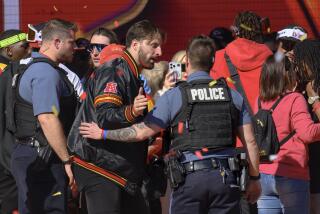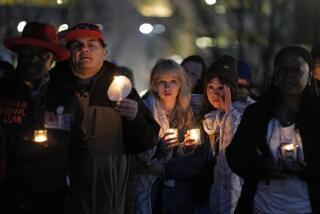Thunderstorms, counter-protesters and calm on Ferguson’s streets
- Share via
Reporting from Ferguson, Mo. — What began as a calm evening in Ferguson with small groups of protesters walking along West Florissant Avenue chanting in unison, “Hands up, don’t shoot,” briefly turned confrontational when a Missouri couple arrived with posters in support of the police officer who killed Michael Brown.
“People never hear the other side,” said the woman, who would give only her first name, Dawn.
Ferguson Police Officer Darren Wilson shot Brown, 18, on Aug. 9, touching off nearly two weeks of unrest and racial tension in this mostly black St. Louis suburb. Wilson is white and Brown was black.
Both Dawn and her husband, Chuck, held signs that read, “Justice for Police Officer Wilson,” as they stood and then walked along West Florissant for about 15 minutes.
Dozens of protesters rushed toward the couple, some screaming obscenities, prompting police to form a protective shield around them.
“How they going to come out here with that? It’s disrespectful,” said Anthony Rubin, 22, who lives in the Canfield Green Apartments near where Brown was killed. “Move out of here with all that nonsense.”
As protesters rushed to engage the couple, officers ushered Dawn and Chuck into an idling police car that escorted them out of the area.
“Stay calm, everyone. Please, stay calm,” police blared from megaphones attached to armored vehicles that have lined the streets here daily.
“When people come and do that, they asking for trouble,” said Ryan Walls, 28, who lives in north St. Louis.
At a 1:15 a.m. CDT new conference, Missouri Highway Patrol Capt. Ron Johnson said the night was mostly quiet.
“You can often tell how the night is going by the radio traffic. And tonight the radios were mostly quiet. Light traffic on the radios and light traffic on the streets. The crowd was smaller and they were calm,” said Johnson, who oversees all law enforcement in Ferguson.
Johnson thanked residents of the community for self-policing and clergy members for their support. By early Thursday, six arrestes had been made. No handguns were seized.
Severe thunderstorms moved through the area early Wednesday evening, with flashes of lightning and rain that prompted some protesters to take shelter in restaurants and parked cars.
Still, more than 100 remained in the street chanting, “We’re young, we’re strong, we’re marching all night long.”
As the evening wore on, the crowd dwindled, but a few dozen continued to march. “No justice, no peace,” they chanted. “Hands up, don’t shoot.”
The atmosphere was peaceful once again. The rain had stopped, but thunderclouds and lightning hovered on the horizon.
Among the dwindling number of demonstrators were several dozen clergy who were marching to exert a calming influence on the younger people in the crowd.
“We felt like we were in a place to speak with them, about how they felt, and how to channel it,” said the Rev. Zacheriah Davis, 36, a pastor at the Greater Harvest Church in St. Louis.
“The majority of these people are coming here because it’s in the news, they want their voices heard, and they’re angry,” Davis said. “This is essentially ground zero.”
In the late afternoon, while the hot sun was still shining, a few Missouri Highway Patrol troopers watched from the shade of Red’s BBQ restaurant as media and out of towners patrolled Ferguson’s slightly surreal streets.
Television tents for CNN and MSNBC had been assembled along the strip. Traffic slowed to a crawl next to the mid-street shrine where Brown was shot to death.
Four television cameramen swarmed around St. Louis Alderman Antonio French as he walked arm-in-arm with Iyanla Vanzant, a TV personality and inspirational speaker who had brought her crew to town.
Standing in the parking lot of the barbecue joint was Anthony Williams, 60, a Lutheran pastor and reporter for the Chicago Crusader who had made the drive to Ferguson Wednesday morning with his brother-in-law.
“Behind the negative, I see this in a larger moment,” Williams said. “What’s happening here will ultimately heal the nation. ... Ferguson has basically become the heartbeat to address violence. ... It’s the spirit of the time — in Greek, they call it ‘kairos’ time. Like JFK’s assassination. You have these moments in history when kairos time is speaking to us.”
Williams believes this moment calls for a national “push toward civility.”
Back on the darkened street, midnight came and went. Peace had broken out.
@kurtisalee
@mattdpearce
More to Read
Sign up for Essential California
The most important California stories and recommendations in your inbox every morning.
You may occasionally receive promotional content from the Los Angeles Times.











